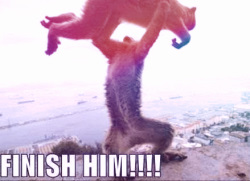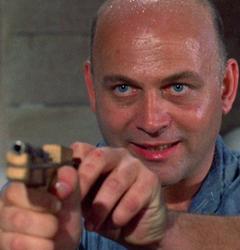Yeah, I agree.Speaker to Animals wrote: Fri Jan 04, 2019 10:17 am The mathematical error is assigning the probability to the act of choosing rather than the physical location of the prize.
In reality, the prize is in one of two cups. It makes no difference statistically if you change your choice.
What Book Are You Reading at the Moment?
-
DBTrek

- Posts: 12241
- Joined: Wed Jan 25, 2017 7:04 pm
Re: What Book Are You Reading at the Moment?
"Hey varmints, don't mess with a guy that's riding a buffalo"
-
Martin Hash

- Posts: 19229
- Joined: Wed Jan 20, 2010 2:02 pm
Re: What Book Are You Reading at the Moment?
???
The odds changed: what if the tipped over cup had the $100, then your chance becomes zero.
The odds changed: what if the tipped over cup had the $100, then your chance becomes zero.
Shamedia, Shamdemic, Shamucation, Shamlection, Shamconomy & Shamate Change
-
DBTrek

- Posts: 12241
- Joined: Wed Jan 25, 2017 7:04 pm
Re: What Book Are You Reading at the Moment?
The odds changed, but you’re also making a new choice based on the new odds - this 50% cup or that 50% cup.
But I get it, many mathematicians think me and StA are wrong, though none seem able to explain why in plain English.
But I get it, many mathematicians think me and StA are wrong, though none seem able to explain why in plain English.
The problem is a paradox of the veridical type, because the correct choice (that one should switch doors) is so counterintuitive it can seem absurd, but is nevertheless demonstrably true. The Monty Hall problem is mathematically closely related to the earlier Three Prisoners problem and to the much older Bertrand's box paradox.
https://en.m.wikipedia.org/wiki/Monty_Hall_problem
"Hey varmints, don't mess with a guy that's riding a buffalo"
-
Fife

- Posts: 15157
- Joined: Wed Nov 30, 2016 9:47 am
Re: What Book Are You Reading at the Moment?
Switching gives you a 66.7% at the $100.
Sticking gives you a 33.3% at the $100.
Here it is in plain English:
The Monty Hall Problem: The Remarkable Story of Math's Most Contentious Brain Teaser
Sticking gives you a 33.3% at the $100.
Here it is in plain English:
The Monty Hall Problem: The Remarkable Story of Math's Most Contentious Brain Teaser
It's really very interesting and fun.Mathematicians call it the Monty Hall Problem, and it is one of the most interesting mathematical brain teasers of recent times. Imagine that you face three doors, behind one of which is a prize. You choose one but do not open it. The host--call him Monty Hall--opens a different door, always choosing one he knows to be empty. Left with two doors, will you do better by sticking with your first choice, or by switching to the other remaining door? In this light-hearted yet ultimately serious book, Jason Rosenhouse explores the history of this fascinating puzzle. Using a minimum of mathematics (and none at all for much of the book), he shows how the problem has fascinated philosophers, psychologists, and many others, and examines the many variations that have appeared over the years. As Rosenhouse demonstrates, the Monty Hall Problem illuminates fundamental mathematical issues and has abiding philosophical implications. Perhaps most important, he writes, the problem opens a window on our cognitive difficulties in reasoning about uncertainty.
-
Fife

- Posts: 15157
- Joined: Wed Nov 30, 2016 9:47 am
Re: What Book Are You Reading at the Moment?
I stated that I knew where the bill was, and intended to show you only a penny.Martin Hash wrote: Fri Jan 04, 2019 10:19 am ???
The odds changed: what if the tipped over cup had the $100, then your chance becomes zero.
As discussed in the book I linked, if the "host" *doesn't* know where the prize is, then the probabilities are different.
-
Fife

- Posts: 15157
- Joined: Wed Nov 30, 2016 9:47 am
-
DBTrek

- Posts: 12241
- Joined: Wed Jan 25, 2017 7:04 pm
Re: What Book Are You Reading at the Moment?
Ah, I see.
Ok, makes sense.
Ok, makes sense.
"Hey varmints, don't mess with a guy that's riding a buffalo"
-
Fife

- Posts: 15157
- Joined: Wed Nov 30, 2016 9:47 am
Re: What Book Are You Reading at the Moment?
Also, it's a pretty simple simulation to run:
https://betterexplained.com/articles/un ... l-problem/
https://www.mathwarehouse.com/monty-hal ... on-online/
https://betterexplained.com/articles/un ... l-problem/
https://www.mathwarehouse.com/monty-hal ... on-online/
-
Speaker to Animals

- Posts: 38685
- Joined: Wed Nov 30, 2016 5:59 pm
Re: What Book Are You Reading at the Moment?
The mistake is in assigning the probability to the choice rather than the physical location. That is a mistake.
The probability refers to whether the prize is beneath a particular cup, not your choosing the winning cup.
It is a problem of semantics making the math seem to change. In reality, there is a fifty percent chance it is underneath the cup you already chose, and a fifty percent chance it is beneath the one you did not choose.
Your choice has no impact on the location of the prize, so changing it matters not.
The probability refers to whether the prize is beneath a particular cup, not your choosing the winning cup.
It is a problem of semantics making the math seem to change. In reality, there is a fifty percent chance it is underneath the cup you already chose, and a fifty percent chance it is beneath the one you did not choose.
Your choice has no impact on the location of the prize, so changing it matters not.
-
Speaker to Animals

- Posts: 38685
- Joined: Wed Nov 30, 2016 5:59 pm
Re: What Book Are You Reading at the Moment?
In my opinion, this is a big problem in applied mathematics. Mathematicians rarely study semantics, or really linguistics of any kind.
If you ask a CS guy lime me with some education in computational linguistics, then I suspect most often that guy will agree that it matters not whether you change your choice (statistically).
I am fairly certain a doctorate in linguistics would spot the problem right away.
If you ask a CS guy lime me with some education in computational linguistics, then I suspect most often that guy will agree that it matters not whether you change your choice (statistically).
I am fairly certain a doctorate in linguistics would spot the problem right away.